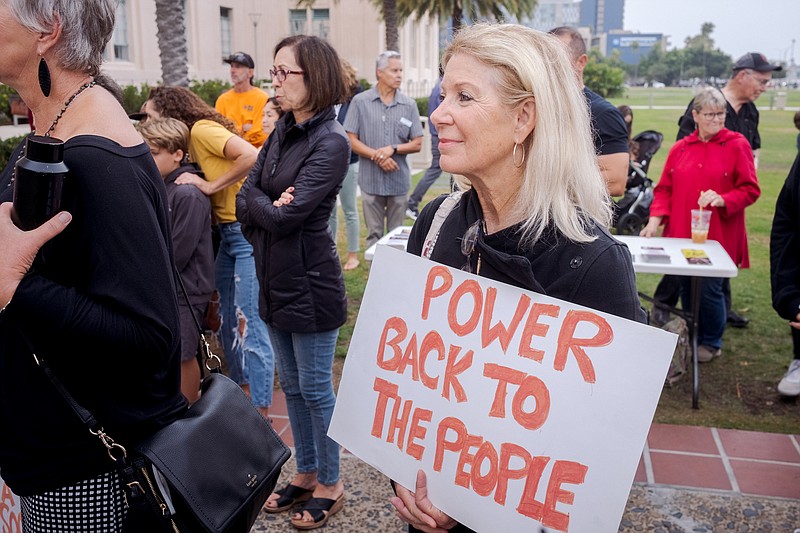September 1, 2021
-KPBS
A divided San Diego County Board of Supervisors has voted to adopt what is believed to be a first-in-the-nation policy of declaring COVID-19 misinformation a public health crisis and adopt a series of recommendations to actively combat it.
“Combating health misinformation needs to start on the ground, in counties and cities across our nation,” said Board Chairman Nathan Fletcher, who authored the policy. “San Diego County took the first step by becoming the first local jurisdiction in the country to align its policies with the U.S. surgeon general’s recommendations to fight health misinformation. Health misinformation is a national crisis and it requires all of us to fight against it together.”
Tuesday night’s vote was 3-2, with Supervisors Jim Desmond and Joel Anderson voting no. The final result came after hours of debate featuring testimony from hundreds of residents, many who opposed the measure. Fletcher characterized them as “mostly right-wing, anti-vaxxers.”
Addressing opponents during the meeting, Fletcher said: “Nothing in this measure will take away anyone’s right to free speech. But this will empower medical experts to lend their knowledge to provide people with info about what they may be hearing. Our efforts today are to help us in the cause to get beyond COVID-19. I can promise you that no one ever ran for public office saying, `I want to close businesses, I want to wear masks.’ We want to get out of this pandemic without any closures or further mandates.”
Some opponents worried that the measure would quash the free exchange of ideas.
“You can believe in science and also ask questions. In fact, science is all about asking questions,” San Diego nurse Ciana King told the board “Science is a constant discovery and we know that the evidence is always changing. You can follow the science and know that there is bias in research. Understanding this is the key of being an intelligent consumer of information. What does this entity have to gain from presenting this information? If the answer is more money, you may want to dig in a little more.
“You can be a medical professional and respect a patient’s right to choose. In fact, you must: This is called autonomy, and it’s the first principal in the nursing code of ethics,” King continued. “As nurses who have dedicated our lives to caring for patients, respecting their autonomy and advocating for their well-being, that’s all we’re asking for in return: The right to choose.”
Prior to the public comment period, representatives from San Diego- area hospitals spoke out in support of the measure, saying that hospital resources are being stretched thin by a surge of COVID-19 cases in unvaccinated people.
“Misinformation is a poison to our communities,” said Amber Ter- Vrugt, Scripps Health senior director of government relations.
Ter-Vrugt said Scripps has experienced staff shortages and that some patients have delayed critical health care needs due to the latest rise in cases.
“Even some patients admitted continue to push back against recommendations. We have the responsibility to address this misinformation,” she said.
Sharp HealthCare Executive Vice President and Chief Operating Officer Brett McClain said, “We need to promote the facts, and the facts are that this current surge is a surge of the unvaccinated.”
Fletcher’s resolution directs the county’s chief administrative officer to implement the following strategies cited by U.S. Surgeon General Vivek Murthy in his advisory:
— Devote resources to identify and label health misinformation and disseminate timely health information to counter misinformation that is impeding the county’s ability to keep the community safe;
— Modernize public health communications with investments to better understand gaps in health information, and questions and concerns of the community, especially in hard-to-reach communities. Develop targeted community engagement strategies, including partnerships with trusted messengers;
— Expand research efforts to better define and understand the sources of health misinformation, document and trace its costs and negative impacts, and develop strategies to address and counter it across mediums and diverse communities;
— Invest in resilience against health misinformation including digital resources and training for health practitioners and health workers. Explore educational programs to help communities distinguish evidence-based information from opinion and personal stories;
— Partner with federal, state, territorial, tribal, private, nonprofit, research and other local entities to identify best practices to stop the spread of health misinformation;
— Identify resource gaps to combating health misinformation and working with state and federal partners to meet ongoing needs;
— Work with the medical community and local partners to develop a website that will serve as a central resource for combating health misinformation in the community.




